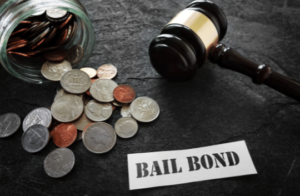Cash bail is used as a guarantee that a defendant will return for a trial or hearings. The money is returned after they make all necessary court appearances, otherwise the bail is forfeited to the government.
In most places, a standard bail amount is set for any alleged offense, but judges typically have broad discretion to raise or lower it. The judge could also waive bail entirely and release a defendant on their “own recognizance,” which means that a person promises that they will show up when they’re supposed to.
Paying the full bail amount may also be done by producing a certified or cashier’s check, money order, or traveler’s checks. A court clerk or the arresting agency may accept a personal check in some cases.
Can The Court Refuse To Take Cash Bail?
There are circumstances where a court will not accept bail if the origin of the funds is suspect such as emanating from a criminal enterprise, especially if a large amount of cash is deposited.
If you are charged with embezzlement of a substantial amount or with drug trafficking for example and you or a friend posts cash bail of $100,000 or more, the court may be suspicious of the fund’s origin.
You have the burden of proving that the source of the funds is legitimate. If not, the court can refuse to accept the cash.
What Will Courts and Jails Accept as Bail?
Bail is usually posted in one of the following ways:
- Paying the full amount of the bail. For instance, if the police or a court set bail at $1,000, a defendant may post (pay) this amount in cash or with a credit card
- Purchasing a bond from a bail bond seller, who typically charges a nonrefundable premium of about 10% of the amount of bail. For example, if the police or a court set bail at $1,000, a defendant can usually purchase a bail bond for $100. The bail bond seller has to forfeit the full bail amount to the court if the defendant who purchased the bond fails to appear in court, or
- Depositing with the court property worth at least the full amount of the bail in some courts. For example, if the police or court set bail at $1,000, and a suspect owns a fancy watch worth at least that amount, the defendant may be able to use the watch to post bail.
What happens with a failure to appear in court?
If a defendant jumps bail, they also forfeit their bail. If you’re the cosigner, this means you also forfeit any bail money you may have paid. This is technically known as a failure to appear in court, and it is a crime. The court will issue a warrant for the defendant’s arrest, and any fees or fines racked up during this period may become your responsibility.
If our client does not show up to court, then it is your responsibility as the cosigner to make sure that he/she is put back on the court calendar. If the defendant is not responsive and goes MIA, we reserve the right to apprehend them and place them back into custody. If we are unable to locate the inmate, ultimately you can be held financially responsible for the entire amount. Ex: If we posted a bond for $50,000 and the defendant does not show up to court, we can hold you responsible for the entire $50,000.
Need help posting bail? We can help
Bail is the temporary release of an accused person awaiting trial, sometimes on the condition that a sum of money is lodged to guarantee their appearance in court.
Southern California Jails We Service:
- Riverside County
- Los Angeles County
- Orange County
- San Bernadino County
- Santa Barbra County
- Ventura County
- Imperial County
Escondido Bail Bonds have the cheapest bail bonds with great services in all of Southern California and have a network of Licensed Bail Agents within 5 miles of every Jail. Please contact us with any questions in regards to the bail process or inmate information.
*Disclaimer: Every effort has been made to ensure the accuracy of this publication at the time it was written. It is not intended to provide legal advice or suggest a guaranteed outcome as individual situations will differ.





